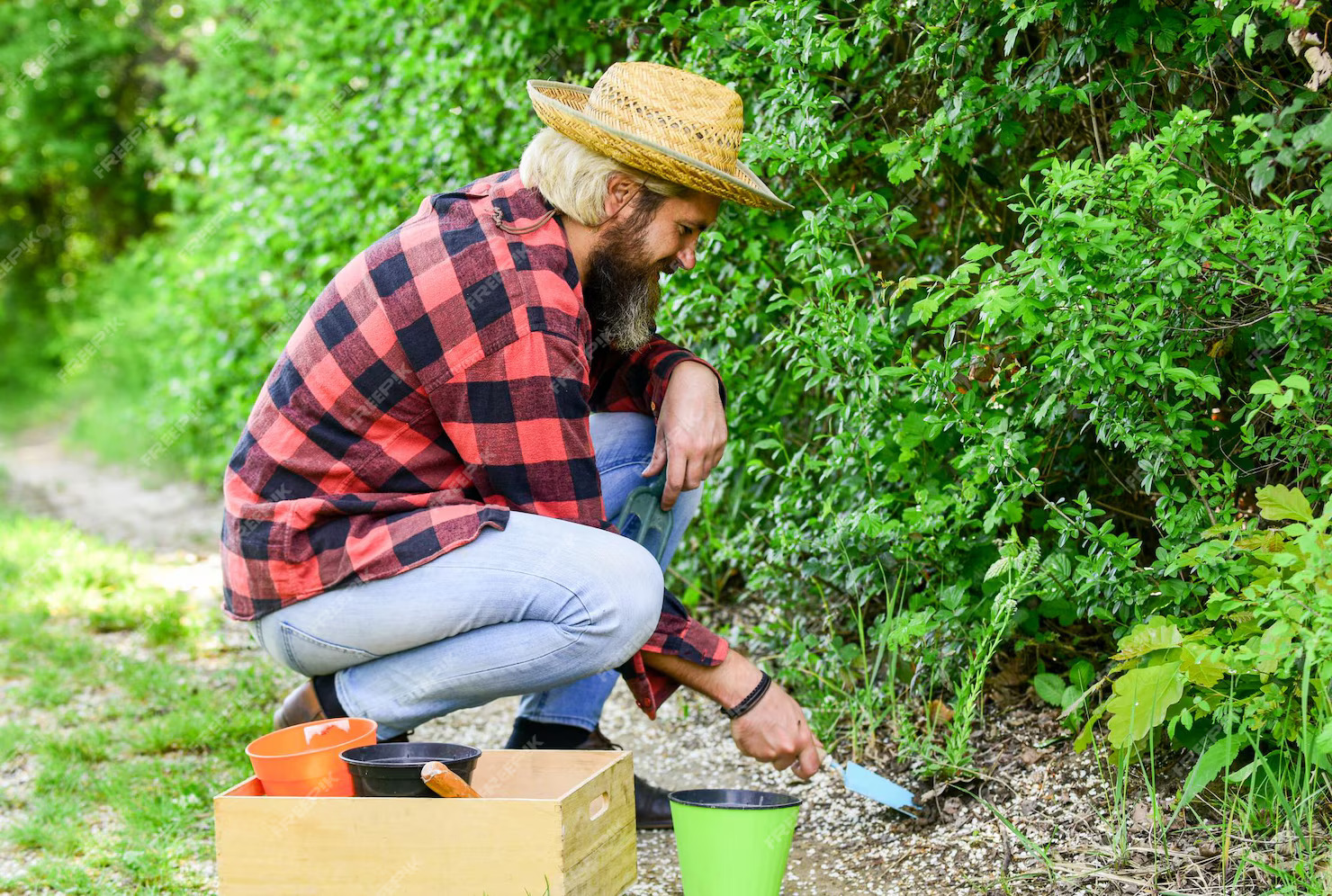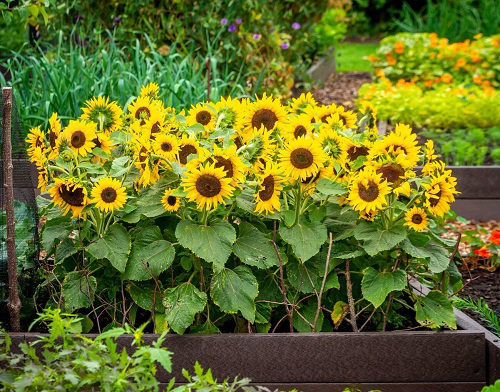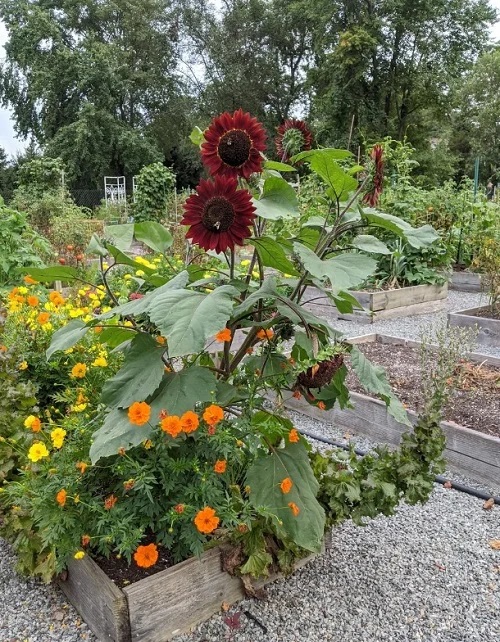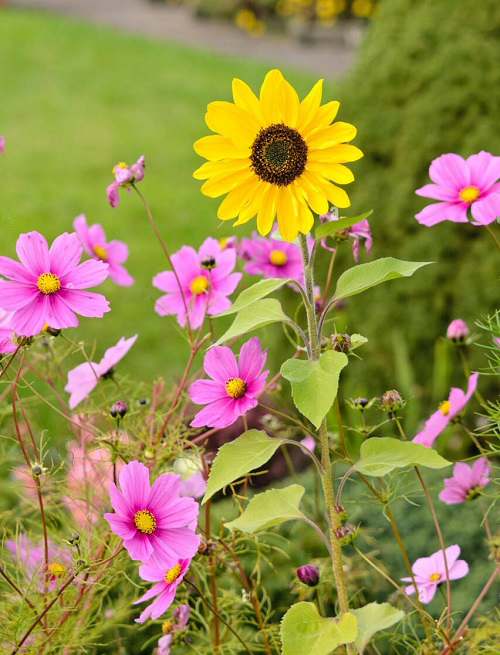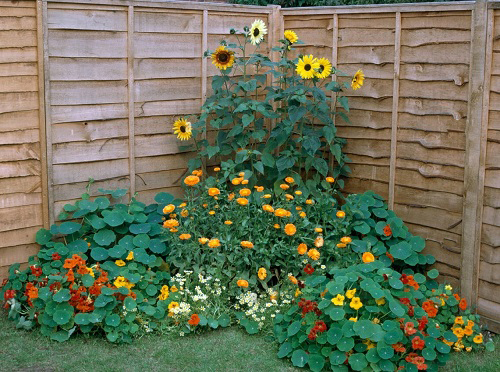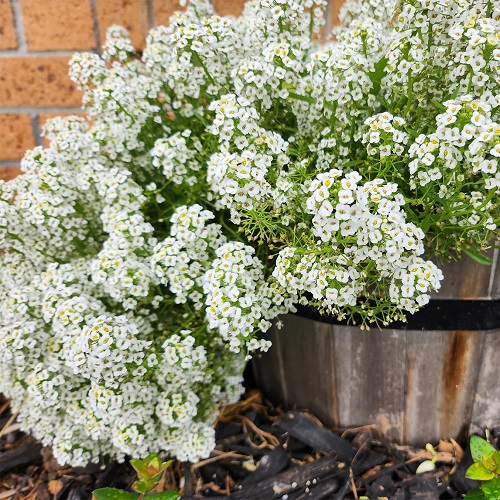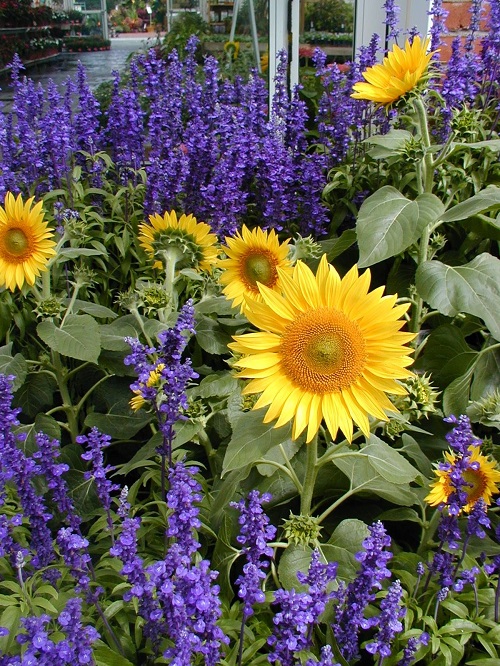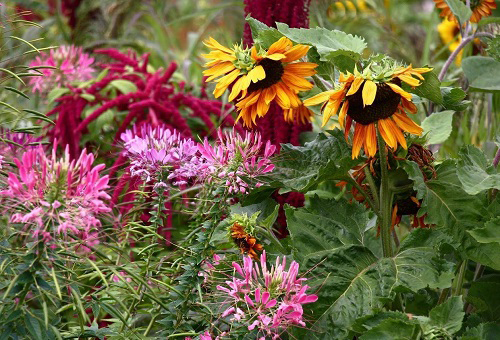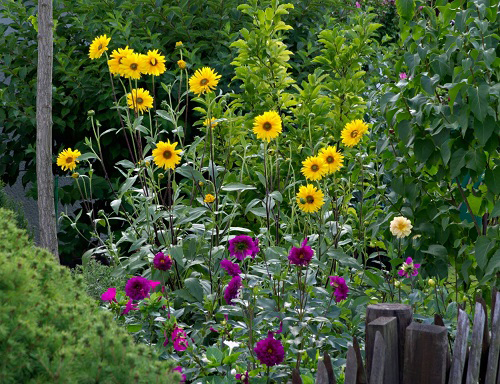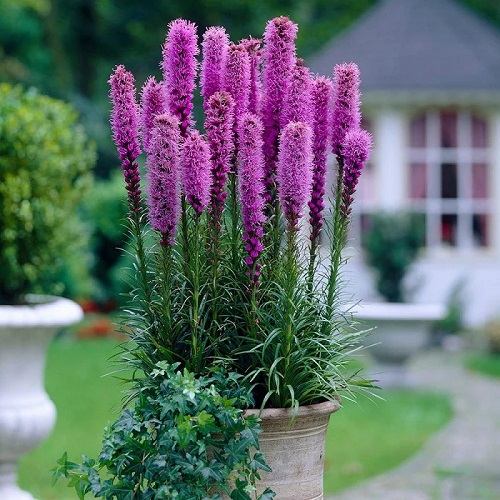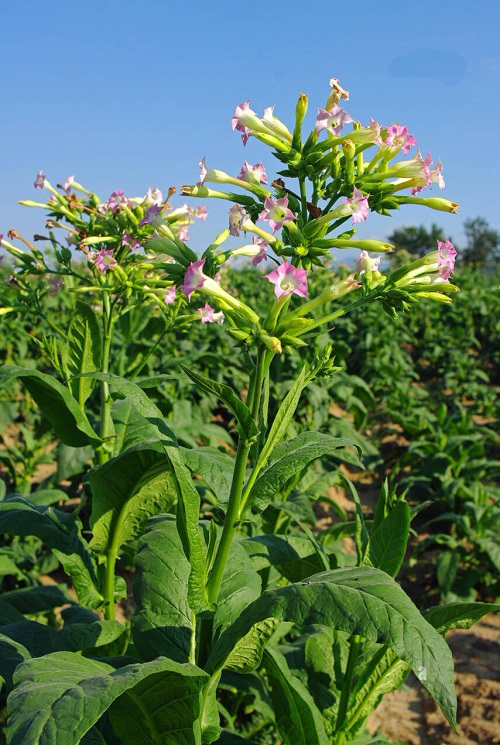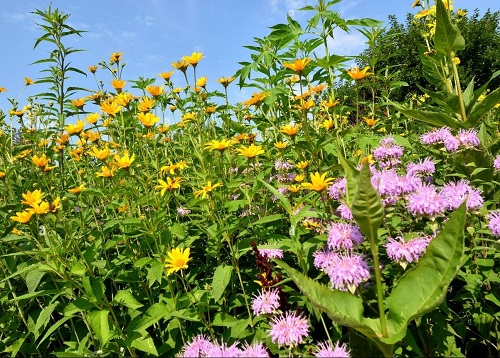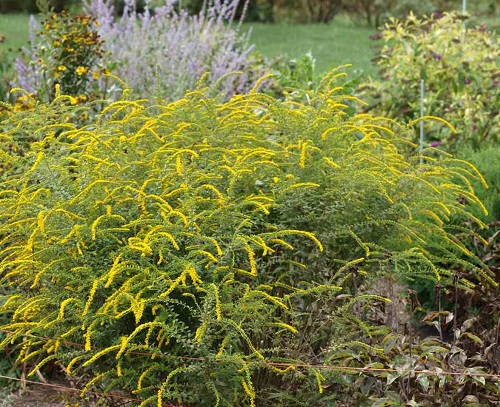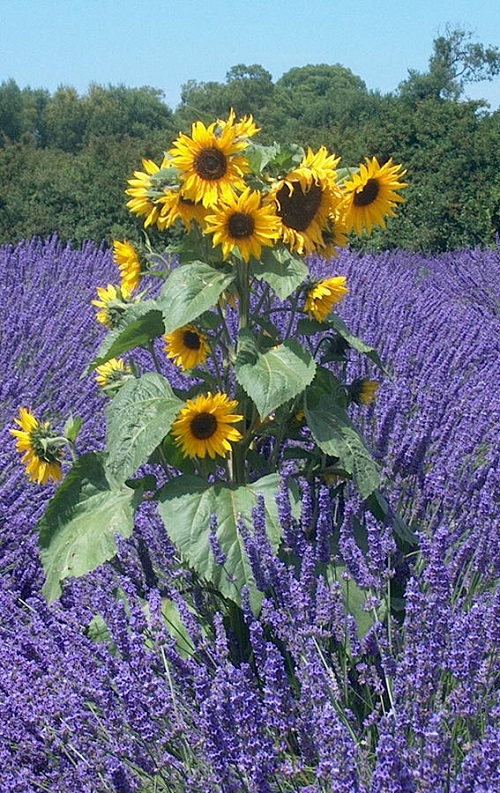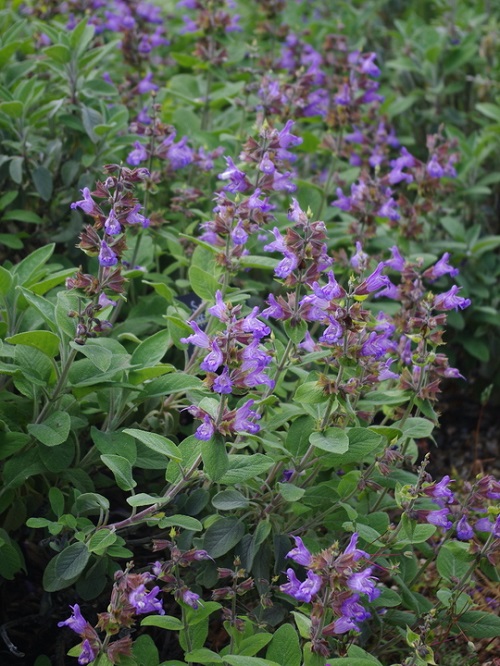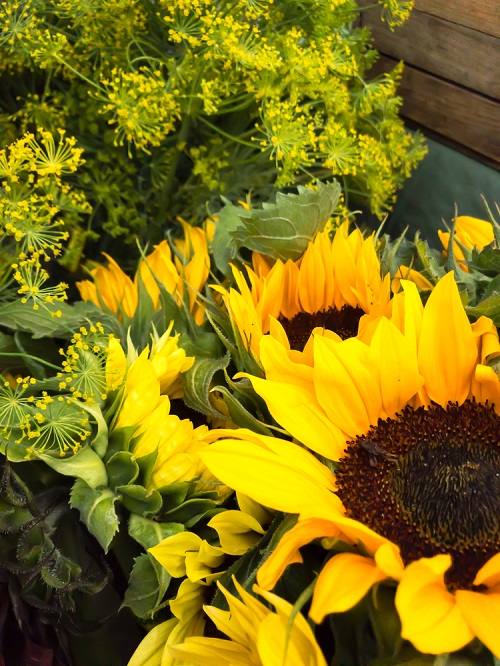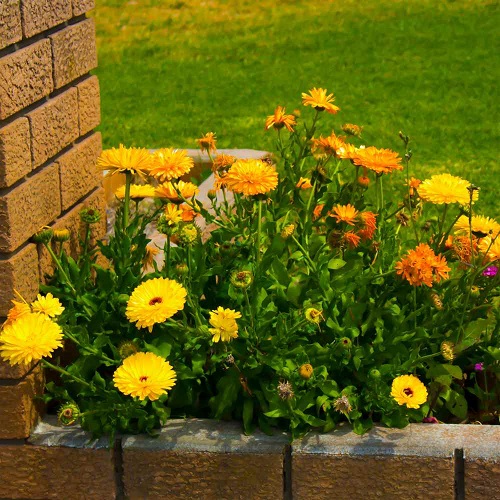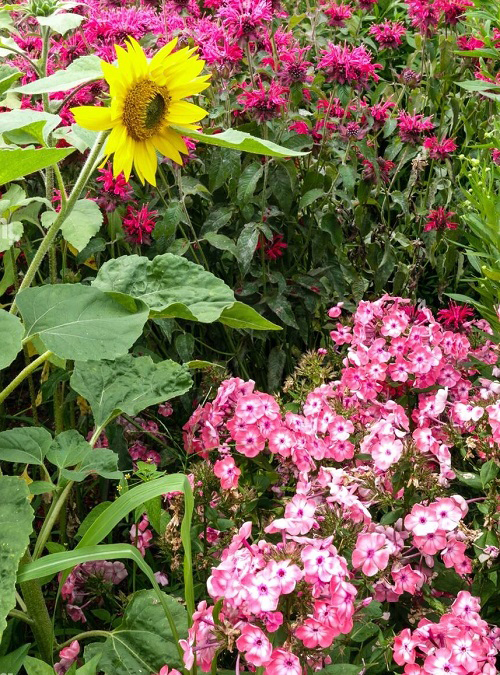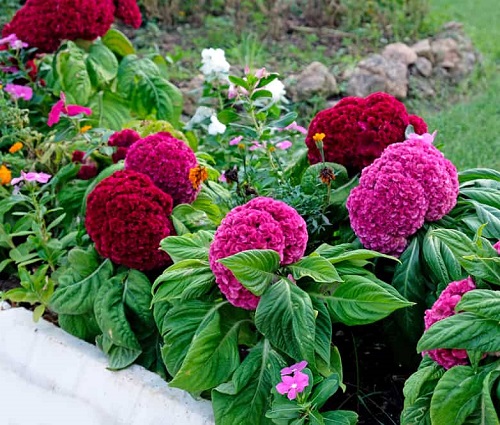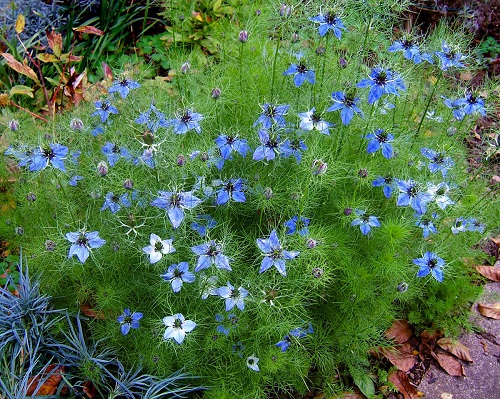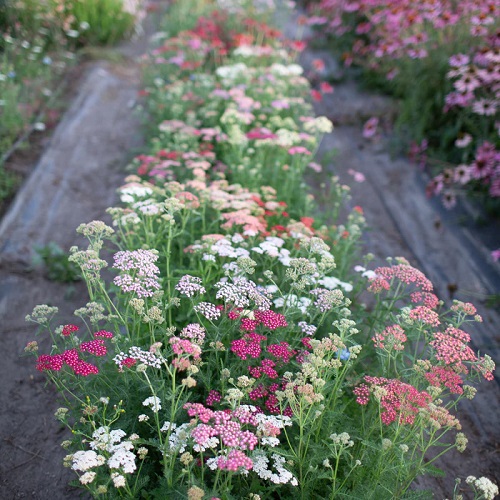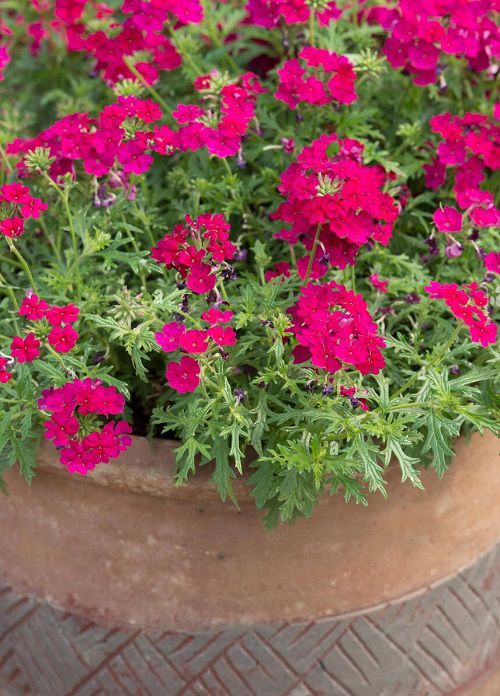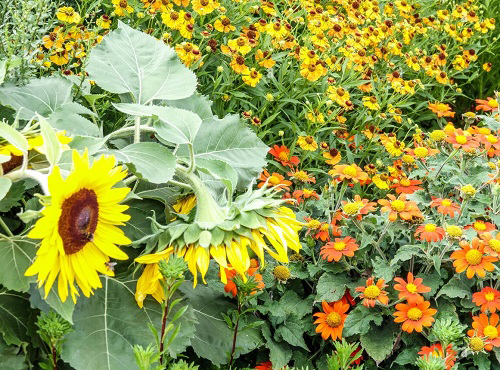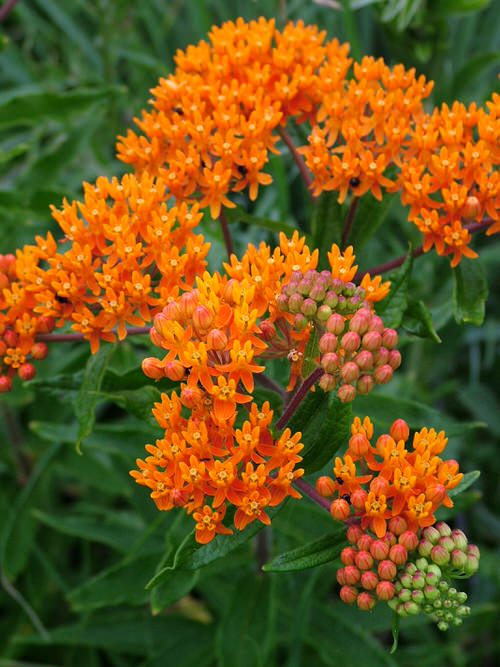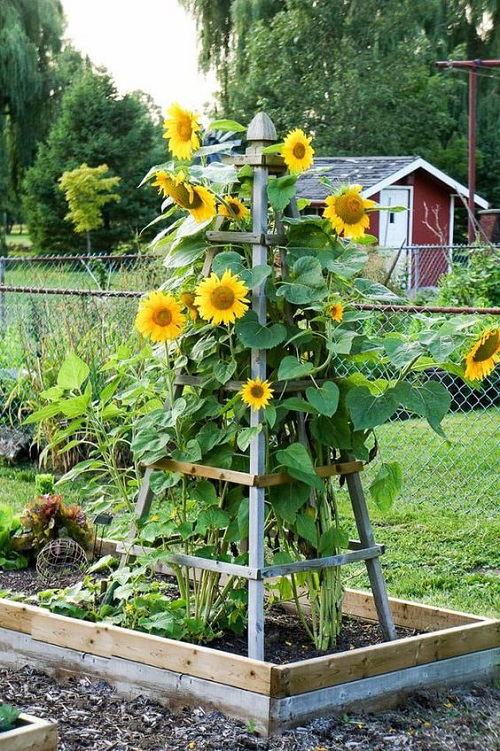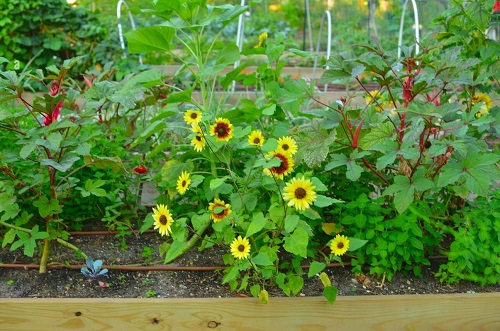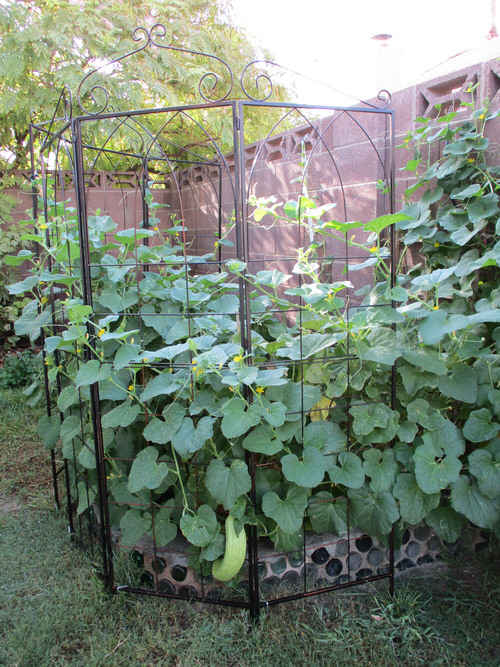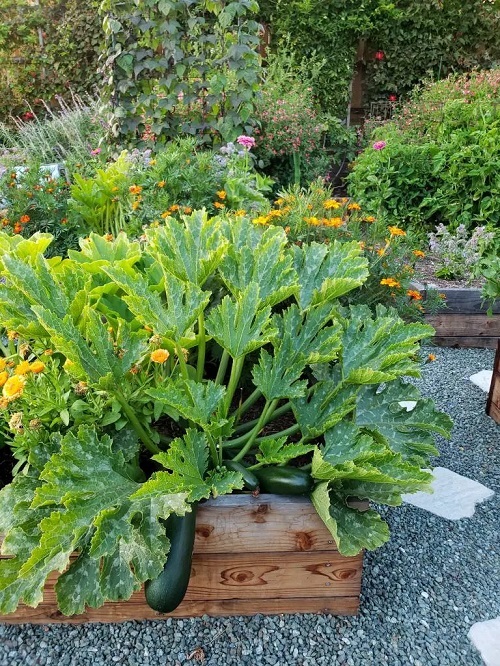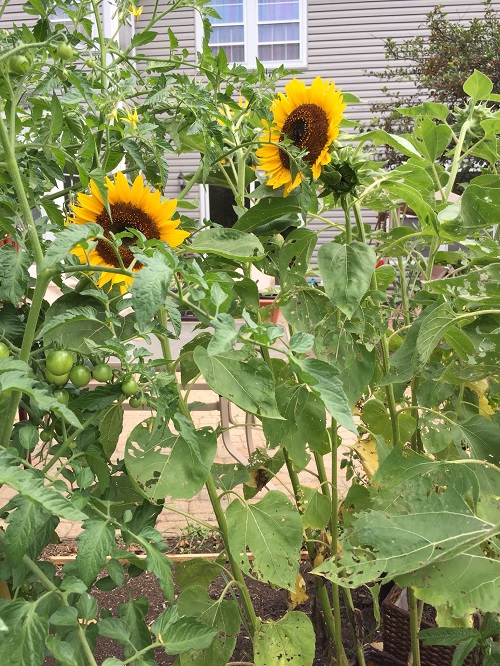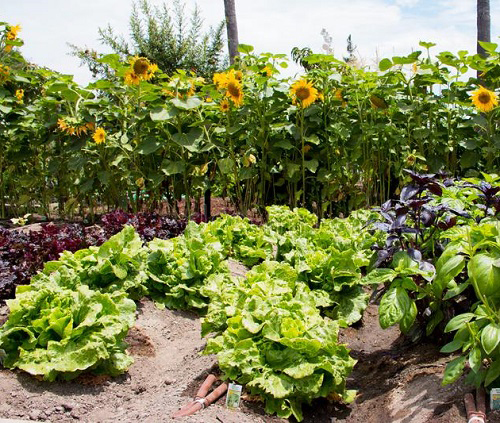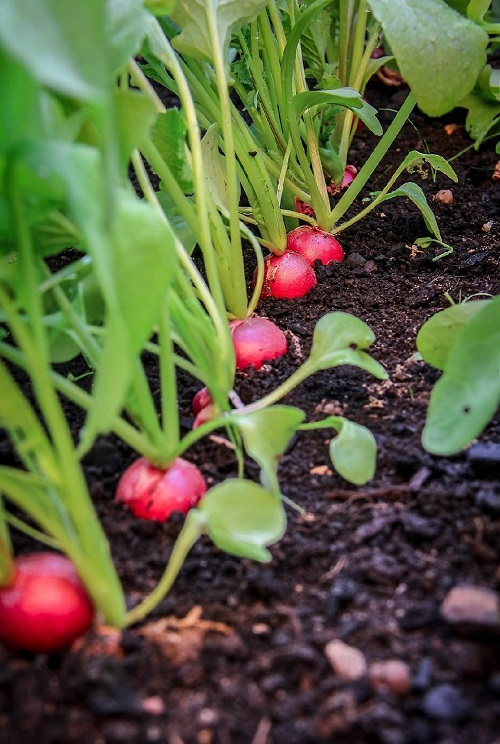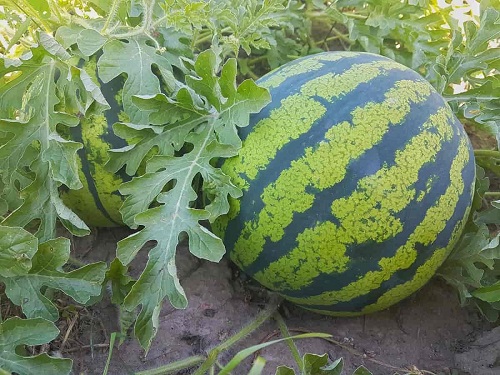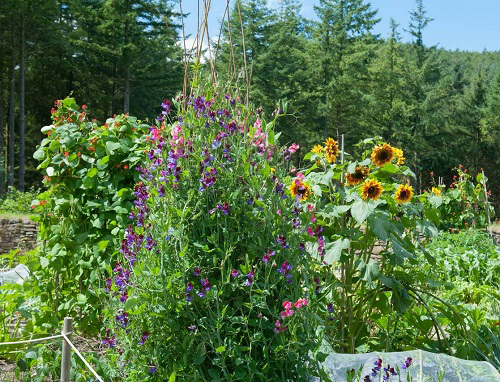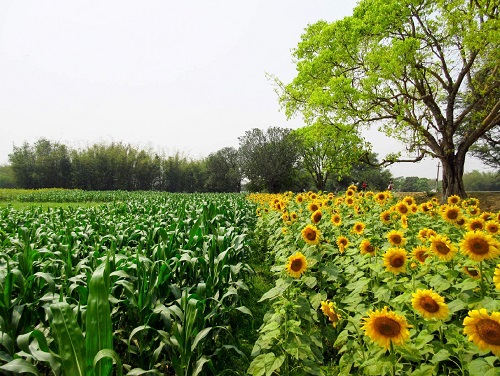Discover the Best Sunflower Companion Plants to enhance the beauty and growth of your garden in this guide.
If you are looking to attract pollinators or repel pests, choosing the right sunflower companion plants can make all the difference. Here are the Best Sunflower Companion Plants that can help your garden flourish and create a stunning display that will turn heads all summer long!
Here are the Best White Sunflower Varieties
Best Sunflower Companion Plants
1. Marigolds
Botanical Name: Tagetes
Marigolds are popular for their pest-deterrent properties; they effectively drive away harmful insects that can damage sunflowers, such as nematodes, aphids, and whiteflies.
2. Zinnias
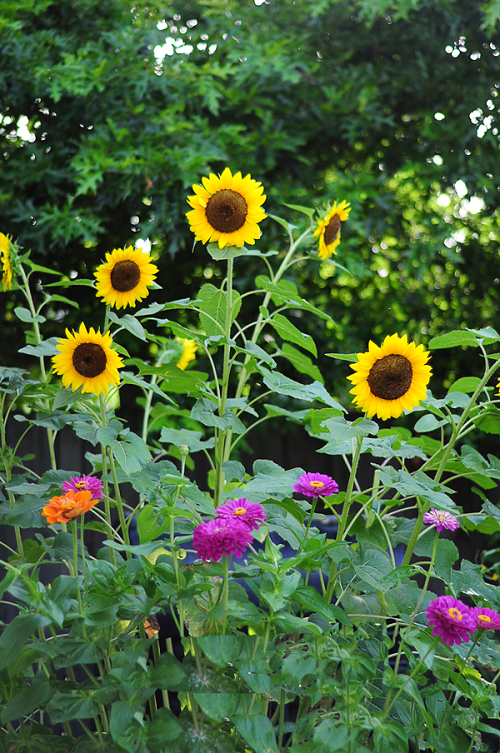
Botanical Name: Zinnia elegans
Zinnias attract many types of pollinators, including bees and butterflies, which are essential for pollinating sunflowers.
3. Cosmos
Botanical Name: Cosmos bipinnatus
Cosmos attract beneficial insects such as hoverflies and lacewings, which feed on aphids and other harmful pests.
4. Nasturtiums
Botanical Name: Tropaeolum majus
Nasturtiums are low-growing plants that can help protect the soil around sunflowers from erosion and weed growth.
5. Sweet Alyssum
Botanical Name: Lobularia maritime
Sweet alyssum can help improve soil health by attracting beneficial insects such as ground beetles and predatory mites.
6. Purple Coneflowers
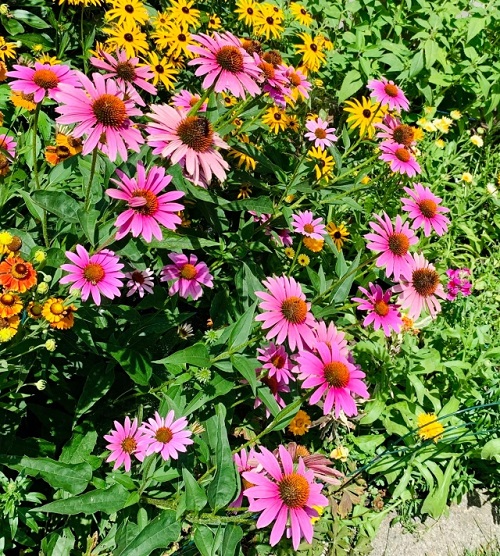
Botanical Name: Echinacea purpurea
They’re excellent for attracting pollinators to the garden. Coneflowers provide support for sunflowers.
7. Salvia
Botanical Name: Salvia
Salvias are versatile plants that come in various colors, from deep purple to bright red. The tube-shaped flowers are loved by hummingbirds and bees.
8. Cleome
Botanical Name: Cleome hassleriana
Cleomes are unique, spidery flowers with a wild look they have long, spindly stems and clusters of pink or white blooms. They are excellent for attracting beneficial insects to the garden, and their pink and white color complement the sunflowers beautifully.
9. Dahlias
Botanical Name: Dahlia
Dahlias have showy flowers ranging from small, ball-shaped blooms to large, plate-sized blooms. They make excellent companion plants for sunflowers as they not only provide a splash of vibrant color but also attract a wide range of pollinators.
10. Liatris
Botanical Name: Liatris spicata
This flowering plant boasts slender spikes of fluffy, purple blooms that add height and texture to any garden bed.
11. Nicotiana
Botanical Name: Nicotiana
The trumpet-shaped flowers and lush green foliage of Nicotiana exude a sweet, intoxicating fragrance that’s hard to resist. It is a great companion plant for sunflowers as the scent helps to repel pests such as aphids, whiteflies, and spider mites.
12. Bee Balm
Botanical Name: Monarda
Monarda is known for its bright, showy flowers and aromatic leaves; it attracts bees, butterflies, and other pollinators to your garden.
13. Rudbeckia
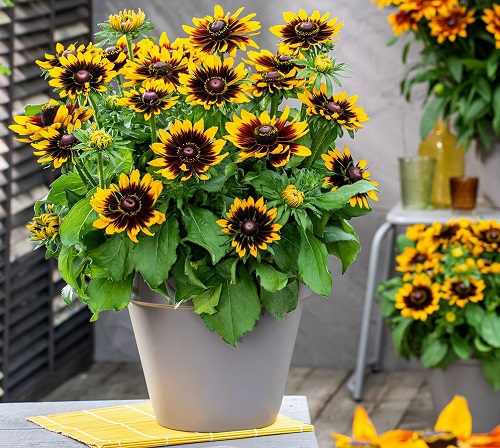
Botanical Name: Rudbeckia
Black-Eyed Susan is an ideal companion plant for sunflowers as it attracts a diverse range of beneficial insects, such as hoverflies, ladybugs, and lacewings, which help to control pests and improve soil health.
14. Goldenrod
Botanical Name: Solidago
Goldenrod is a wonderful companion plant for sunflowers as it produces bright yellow flowers that provide a rich source of nectar for bees, butterflies, and other pollinators.
15. Lavender
Botanical Name: Lavandula
Lavender repels pests such as mosquitoes, moths, and fleas. Additionally, the beautiful color complements yellow, red, and white sunflowers beautifully.
Find the Best Lavender Varieties
16. Chamomile
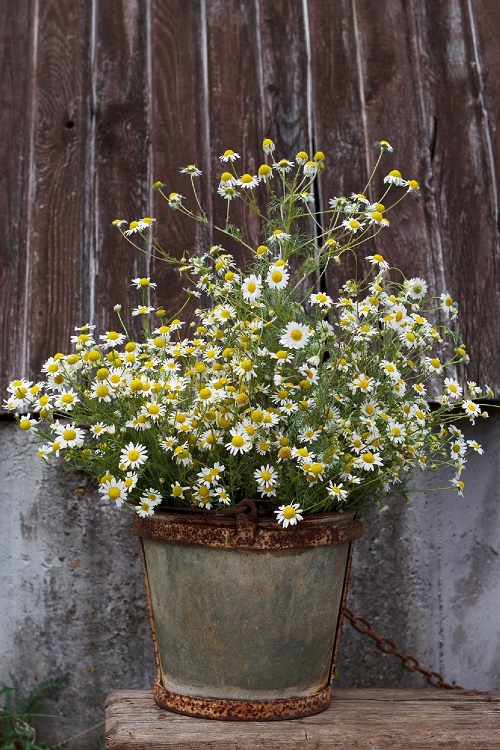
Botanical Name: Matricaria chamomilla
The small, daisy-like flowers and delicate, fern-like foliage make chamomile a popular choice for soothing teas and natural remedies. It makes a good sunflower companion, too, as the roots help to improve soil quality.
17. Sage
Botanical Name: Salvia officinalis
The velvety, gray-green leaves and fragrant purple or blue flowers of sage are a natural pest repellent that can help protect sunflowers from common garden pests.
18. Dill
Botanical Name: Anethum graveolens
Dill adds a distinctive flavor and aroma to many culinary dishes. It also attracts beneficial insects such as ladybugs, lacewings, and hoverflies.
19. Chives
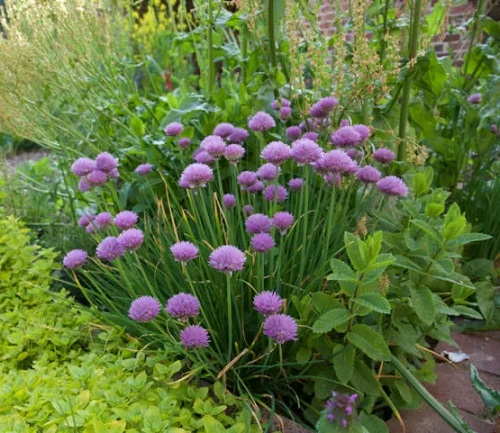
Botanical Name: Allium schoenoprasum
These slender, grass-like plants are prized for their mild, onion-like flavor and delicate, pink-purple blooms that boost the vitality of sunflowers. Chives help sunflowers by repelling pests such as aphids and thrips.
20. Borage
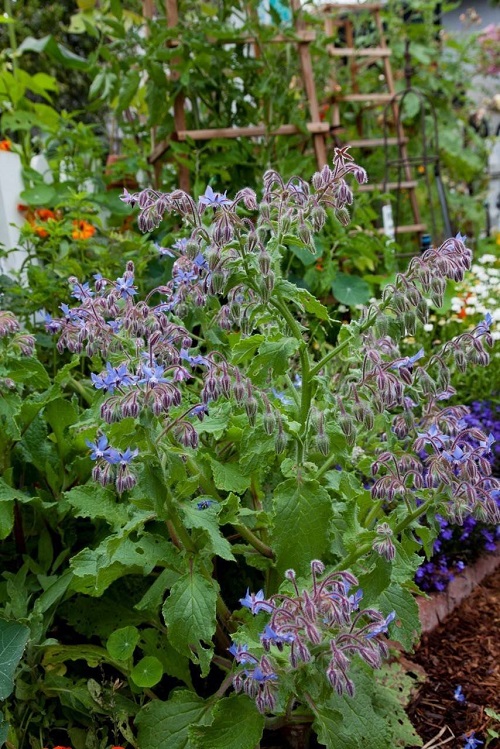
Botanical Name: Borago officinalis
Borage is an ideal companion plant for sunflowers as it attracts beneficial insects to control garden pests such as tomato hornworms.
21. Calendula
Botanical Name: Calendula officinalis
The Calendula helps control garden pests such as aphids and whiteflies by attracting pollinators near sunflowers.
22. Phlox
Botanical Name: Phlox paniculata
Phlox is a great companion plant for sunflowers as it produces a profusion of colorful flowers that attract butterflies and moths.
23. Celosia
Botanical Name: Celosia argentea
The striking, flame-shaped blooms and velvety foliage of Celosia add drama and texture to any flower bed or container garden.
Look at the Stunning Types of Celosia
24. Nigella
Botanical Name: Nigella damascene
Also known as “love-in-a-mist,” it features intricate, lacy foliage and blue or white flowers that resemble delicate pom-poms. It also attracts beneficial insects such as bees and butterflies.
25. Yarrow
Botanical Name: Achillea millefolium
Yarrow is a hardy perennial with feathery, fern-like foliage and clusters of tiny, flat-topped flowers in shades of pink, white, and yellow. Yarrow is a great neighboring plant for sunflowers as it attracts ladybugs, lacewings, and parasitic wasps.
26. Verbena
Botanical Name: Verbena
Verbena is a low-growing, spreading plant that produces clusters of fragrant, purple, or pink flowers. These flowers attract bees and butterflies to your garden and aid sunflower pollination.
27. Mexican Sunflower
Botanical Name: Tithonia diversifolia
Orange blooms and tall, branching stems of Mexican Sunflowers add a splash of tropical color to any landscape. These fiery blooms also attract a ton of pollinators that are beneficial for sunflowers.
28. Milkweed
Botanical Name: Asclepias
Growing milkweed and sunflowers together is beneficial for both species. Milkweed provides food and shelter for monarch butterflies, while sunflowers provide nectar for many types of pollinators.
Best Sunflower Companion Vegetables
29. Beans
Botanical Name: Phaseolus vulgaris
The nitrogen-fixing properties of beans make them a great companion for sunflowers, which require nitrogen to grow.
30. Spinach
Botanical Name: Spinacia oleracea
Sunflowers can provide shade for spinach plants, which prefer cooler temperatures and can also attract beneficial insects to the garden.
31. Cucumbers
Botanical Name: Cucumis sativus
Cucumbers benefit from the shade provided by sunflowers, and they also attract pollinators to the garden.
32. Squash
Botanical Name: Cucurbita pepo
Sunflowers can provide support for squash vines to expand on, and the large leaves of the squash help to shade the soil.
33. Tomatoes
Botanical Name: Solanum lycopersicum
Sunflowers can attract pollinators to the garden, which can help to increase the yield of tomato plants that are nearby, as birds or bees can aid in pollination.
Learn about Growing Spoon Tomatoes
34. Peppers
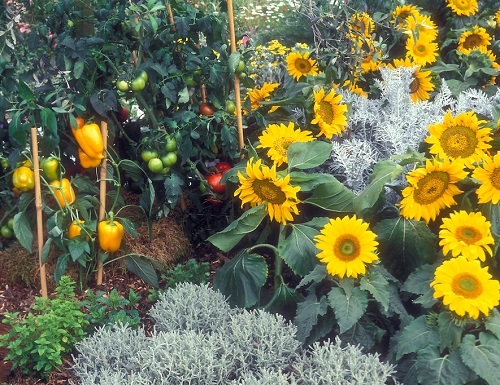
Botanical Name: Capsicum annuum
Sunflowers can help to provide shade for pepper plants, which prefer a slightly cooler environment.
35. Lettuce
Botanical Name: Lactuca sativa
The shade provided by sunflowers can help to prevent the lettuce from bolting or going to seed too quickly.
36. Radishes
Botanical Name: Raphanus sativus
Sunflowers can attract beneficial insects to the garden, which can help to control pests that may damage radish plants.
37. Melons
Botanical Name: Cucumis melo
Sunflowers can provide shade for melon plants, and their tall stalks can be used as a trellis for the vines to grow on.
Learn about Growing Kajari Melons in Pots
38. Peas
Botanical Name: Pisum sativum
Sunflowers can support pea plants to grow on, and their tall stalks can also provide shade for the soil.
39. Carrots
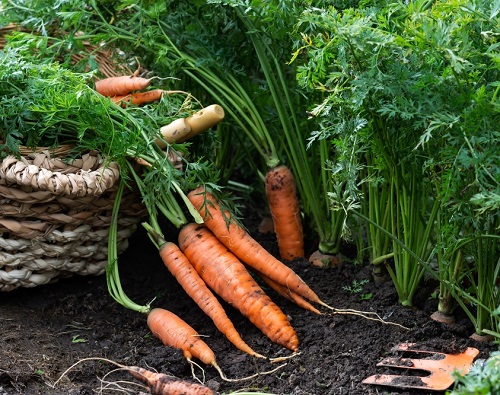
Botanical Name: Daucus carota
Sunflowers can attract beneficial insects to the garden, which can help to control pests that may damage carrot plants.
40. Broccoli
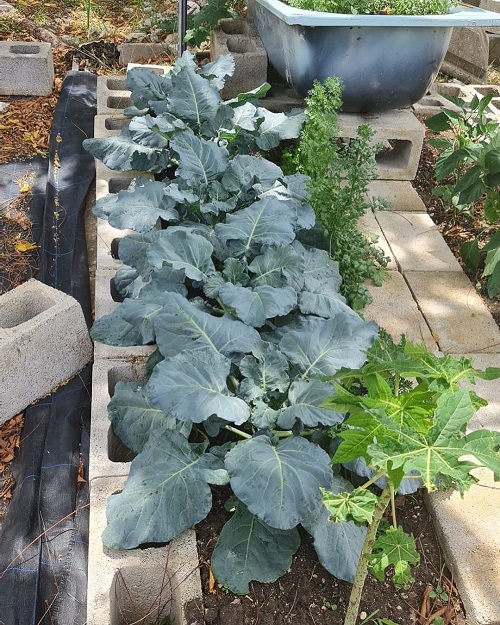
Botanical Name: Brassica oleracea
Sunflowers can provide shade for broccoli plants, which prefer cooler temperatures, and can also attract beneficial insects that prey on pests that may damage the broccoli.
41. Kale
Botanical Name: Brassica oleracea var. acephala
Sunflowers can provide shade for kale plants, which can help to prevent them from bolting too quickly in hot weather.
42. Corn
The sunflowers shade the corn, keeping it from drying out and giving it a more even temperature. They also provide a windbreak, keeping the corn from being damaged by the wind.

